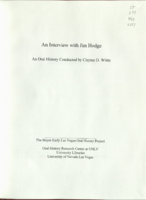Search the Special Collections and Archives Portal
Search Results

Transcript of interview with Hank Gordon by Claytee D. White and Stefani Evans, October 26, 2016
Date
Archival Collection
Description
As we go about our days, running errands and getting things for our households, we often don’t think too much of the story behind the commercial real estate and retail stores we frequent. Only when those stores aren’t there and the neighborhood demographic changes do we embrace the nostalgia that goes into the story of the neighborhoods where we live and shop. Hank Gordon is the man behind those memories of those shopping centers we frequent not only in the Las Vegas Valley, but in Washington, Oregon, Montana, California and Alaska as well. Gordon was raised in Los Angeles and graduated from USC in 1956, when he went to work for a home builder in the San Fernando Valley selling his houses to make some extra weekend money. It was during this time he fell in love with real estate and had to break the news to his parents that he no longer was going to be a doctor. Feeling the urge of leadership he told his mentor that he didn’t want to sell houses-he wanted to develop homes instead. Shortly after that he bought a subdivision of lots in Van Nuys and started building 7-11 and Goodyear stores in the early 1960s. In this interview, Gordon talks about building his first shopping center in 1967 and moving to the Pacific Northwest. He moved to Las Vegas in 1988, when he bought 23 new national retailers to the Valley. He was responsible for bring Home Depot in 1999 and Costco and Best Buy to some of Las Vegas’s longest-standing shopping centers; Best of the Boulevard on Maryland Parkway and Best of the West on Rainbow Boulevard. He speaks of the changes to the market after the Great Recession, how retailers are having a hard time keeping afloat because of online shopping, and his days on the planning commission for the City of Las Vegas during the 1990s, when Jan Jones was mayor. It is without a doubt that Hank Gordon is one of the best in the business and there isn’t a lot of competition at the top.
Text

Transcript of interview with Cindy Coletti and David Fordham by Stefani Evans and Claytee White, October 27, 2016
Date
Archival Collection
Description
The interior of the green house at the end of the cul-de-sac envelops the visitor. Every room exudes comfort and encourages conversation even as the lake, lapping quietly on three sides of the house, beckons. Cindy Coletti revels in this house and its interiors, all of her own design, especially because they are so different from the daring, opulent, and award-winning custom homes for which she is known. Arriving in Las Vegas in 1988 as a single mother, Cindy immediately submitted a successful design for the first Southern Nevada Street of Dreams event and began networking. She established Sun West Custom Homes in Nevada by applying the design and contracting skills she had successfully honed by building nearly seventy houses in California, Florida, and Colorado—all the while grooming her son Danny—from the time he was in his teens—to eventually take over the company. In this interview, Cindy's husband, David Fordham, shares his background, his reasons for relocating to Las Vegas, work in commercial real estate, meeting Cindy, and living at The Lakes. Cindy then recalls the experiences that brought her to Las Vegas; shaped her ideas of self-help, friendship, design, and business, and instilled in her the confidence to succeed in a man's world. Cindy has retired from building and now enjoys traveling with her husband, but Sun West Custom Homes continues to thrive under the capable ownership and leadership of Daniel S. Coletti.
Text

Lillian Morrison interview, 1996: transcript
Date
Archival Collection
Description
Lillian Morrison was the first uniformed female who worked for Park Service and has worked for Reclamation for 20 years during the war at Camp Williston. Morrison recalls life in Boulder City during the late 1930s and 1940s. Morrison is the wife of Lloyd Shorty Morrison.
Text

Nanyu Tomiyasu interview, April 12, 1977: transcript
Date
Archival Collection
Description
On April 12, 1977, collector Mark French interviewed Nanyu Tomiyasu (born May 28th, 1918 in Las Vegas, Nevada) at the University of Nevada, Las Vegas. In this interview, Nanyu Tomiyasu discusses growing up and working on his father’s (Bill Yonema Tomiyasu) farm in Las Vegas, Nevada. He also discusses how his father came to Las Vegas and being one of the few Japanese families in Las Vegas as a child.
Text

Eddie Escobedo interview, February 25, 2019: transcript
Date
Archival Collection
Description
Interviewed by Maribel Estrada Calderón. Claytee White also participates in the questioning. Eddie Escobedo was born in 1961 and two years later, he and his family immigrated to the United States. He fondly remembers his father, Edmundo Escobedo. Escobedo is currently in charge of the newspaper that his father started, El Mundo Newspaper.
Text

Transcript of interview with Georgie Clark by Steven E. Pilgram, March 2, 1980
Date
Archival Collection
Description
On March 2, 1980, Steven E. Pilgram interviewed river runner, Georgie Clark (born on November 13, 1910 in Chicago, Illinois) at Sambo’s Coffee Shop in Las Vegas, Nevada. This interview is an in-depth discussion about the Colorado River area, including changes, and new rules and regulations. Georgie also recalls working as a real estate agent and as a ferry command, civil servant in World War II.
Text

Transcript of interview with Jim Hodge by Claytee White, April 13, 2009
Date
Archival Collection
Description
Jim Hodge describes an active and success filled life in this narrative. Born and raised in the South, Jim enlisted in the Navy at the young age of 17, just as World War II was winding down. His primary job was that of a cook. He became smitten with the life of an entertainer after participating in a play and headed for Hollywood in 1952. It was there that he auditioned for Donn Arden, who organized and directed Las Vegas shows. Though he didn't get the part, he did get hired to be a singer for a show featuring Betty Grable. Thus his career was launched and would span the heyday of Las Vegas entertainment from the 1950s to the 1970s. Jim talks about the people, shows and places that touched his life. He also offers thoughts about the changes in the Vegas entertainment scene as well as shares his relationship with his church over the past 40 years.
Text

Transcript of interview with Ron M. Portaro by Stefani Evans and Claytee D. White, July 27, 2017
Date
Archival Collection
Description
Most Las Vegas residents like living in Southern Nevada, but few make the leap of faith that Ron M. Portaro did in 1994. The business and development consultant gave up a "tenure-track, full time, full-benefits, kids-could-go-to-college-for free job" to keep his family in Las Vegas. He had no local job, so he commuted twice a month to the Cleveland and Toledo areas for two years to complete the consulting assignments that fed his young family. As the Ohio native discusses the dysfunctional family into which he was born and was raised, he also talks about forging his own path as an overachiever, about going to college at Penn State at Altoona on a mining engineering co-op program with Morton Salt, working six months out of the year in the salt mines and attending classes the other six months. After transferring to the University of Toledo, he formed his own painting business to pay his tuition and graduated in management in 1978 and earned his JD and MBA in 1981. His mentor at University of Toledo asked him to teach labor management. While teaching labor relations he also began representing athletes as a player agent in the National Football League and the United States Football League back in the day and the Canadian Football League. From there, he became associate director for the Northwest Ohio Center for Labor Management Cooperation at the University of Toledo and later with the Cleveland State Labor Management Center. It was with the latter that he learned the benefits of the BUILT-RITE model of business relations to promote cooperation between and among the building trades, contractors, and owners. In this interview, Portaro speaks to the BUILT-RITE model for cooperation, his 1993 move to Las Vegas and fortuitous meetings of Pastor Paul Goulet of the International Church of Las Vegas, City of Las Vegas councilman Arnie Adamsen, and Charlie Kajkowski of the Las Vegas Public Works Department. He reveals how these connections eventually not only shaped Portaro's life in Southern Nevada; they also enabled him to turn his life experiences, education, and skill set to benefit his church, his family, and his adopted community. The commitment Portaro made in 1994 to remain in Las Vegas has benefitted Southern Nevada tourists, residents, and business owners in countless ways we can appreciate only when we stop to think about how many people had to cooperate and communicate to make our large infrastructure projects come to fruition.
Text

Transcript of interview with Todd S. Polikoff by Barbara Tabach, August 30, 2016
Date
Archival Collection
Description
In 2015, Todd S. Polikoff was named the President & Chief Executive Officer of the Jewish Federation of Las Vegas. (The organization is now known as Jewish Nevada). Todd is a graduate of Stockton University and earned his MBA at Cleveland State University. He has three children: Samuel, Shira and Jordan. Born in 1971 to a steelworker and hairdresser, Jack and Judy Polikoff, Todd grew up in Philadelphia, became a bar mitzvah there, and shocked his mother when he explained he was putting college on hold to move to Israel. In addition to stories about these life memories, Todd also traces his career path to decision-making to a meaningful trip to Moscow a where a defining moment helped him understand his own relationship with Judaism. To the time of this interview, Todd has invested over twenty years in leadership of Jewish Federation and AIPAC in states that include New Jersey, Delaware, Texas, Ohio and Nevada.
Text

Transcript of interview with Rabbi Shea Harlig by Barbara Tabach, March 5, 2014
Date
Archival Collection
Description
Interview with Rabbi Shea Harlig by Barbara Tabach on March 5, 2014. In this interview, Rabbi Harlig discusses the Chabad movement of Orthodox Judaism and establishment of Chabad centers in Las Vegas and Southern Nevada. Rabbi Harlig talks about the property he has acquired for Chabad, and its outreach programs, including supervision of kosher kitchens in hotels. This interview was conducted for the Ward 1: West Charleston Neighborhoods oral history project, and therefore includes zoning and neighborhood discrimination issues, and a tour of the property.
Rabbi Shea Harlig arrived in Las Vegas in 1990 and settled in the Artesian Heights neighborhood of Las Vegas. As Director of Chabad of Southern Nevada, Rabbi Harlig focuses on religious outreach, education and social services, and has helped establish seven Chabad locations throughout the community and also built a school and educational program of the highest standards.
Text
